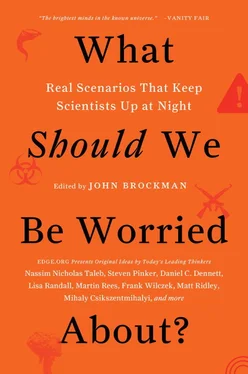It can be social suicide to criticize a silo from within the silo, while external criticism tends to bounce off, ignored. So silos become hostile to dissent, empowering fanatics and power-seekers at the expense of the more moderate and the truth-seekers. Silos also alienate us from one another—even from friends and family members who don’t share our assumptions—because it is fun, and too easy, to demonize the opposition from within a silo. The rise of the Internet seems to correlate with the rise in the late 1990s and 2000s of a particularly bitter partisan hostility that has, if anything, gotten worse and made reaching political compromise increasingly unpopular and difficult. This threatens the health of the republic, considering that compromise has been the lifeblood of politics since the founding.
My solution? For one thing, you can do your part by regularly visiting the opposition and showing them in conversation how reasonable you can be. There’s little more upsetting to a silo than infiltration by an intelligent, persistent individual.
GARY KLEIN
Senior scientist, MacroCognition LLC; author, Sources of Power: How People Make Decisions
The Edge Question this year asks us to identify new worries, but I was not aware that we were running short of things to worry about. Just the reverse—we already have too many threats to keep us up at night. And that’s what worries me. It seems we have entered a new Age of Anxiety. If the problem were internal, it could be treated with anti-anxiety drugs. Unfortunately, the problem is external, in the form of the ever expanding list of fears that science generates and the media are happy to amplify. Bad news sells. We listen more carefully to news reports about a possible blizzard than to a forecast of mild and sunny weather. And so the science/media complex is happy to feed our fears with all kinds of new threats.
I worry that the number of things we need to worry about keeps growing. The science/media complex is inventive at discovering all kinds of threats to our food and our water supplies—delighted to warn about the deterioration of the environment, declining fertility rates, new carcinogens, physical and mental health issues, and so on. The more novel the threat the better, because new dangers avoid our tendency to habituate to scare stories after they’ve been broadcast for a while. Very few old worries get retired. A few diseases, such as smallpox, may be conquered. But even there the science/media complex keeps us worried that terrorists might get hold of smallpox samples or re-create the disease in a lab and wreak havoc on a world that no longer gets smallpox immunization so our vulnerability to smallpox may be increasing, not shrinking.
I worry that the shrillness of worries keeps escalating. In a sea of worries, a new one stands out only if its consequences are apocalyptic. If it doesn’t threaten our civilization, it won’t get much airtime. The pressure is on scientists and media specialists to show that the new issue is not just dangerous but highly dangerous. It cannot merely be contagious; there has to be a means for it to mutate, or perhaps attach itself to a common vector, posing the threat of a deadly new plague. And shrillness isn’t only about the consequences, it’s also about the need to act immediately. To command our attention, the science/media complex has to show that this new problem should jump to the top of our priority list of worries. The threat has to be close to a tipping point beyond which it will become uncontrollable.
And I worry about the proposed remedies for each new danger. To be worth its salt, a new threat has to command rapid and extreme reactions. These reactions have to start immediately, eliminating our chance to evaluate them for unintended consequences. The more over-the-top our fears, the more disproportionate the reactions and the greater the chances of making things worse, not better.
I hesitate to raise the issue, because I’m just adding to the problem, but I do think it’s something worth worrying about, and I don’t see any easy way to counter this new Age of Anxiety. The science/media complex keeps ramping up, continually finding novel dangers, more threats to keep us up at night—and then we have to worry about the consequences of sleep deprivation. It never stops.
DOES THE HUMAN SPECIES HAVE THE WILL TO SURVIVE?
DAVE WINER
Blogging & RSS software pioneer; editor, Scripting News Weblog
Until a few generations ago, the human species was dealing with the following question: “Do we have what it takes to survive?” We answered that question with the invention of heat, plumbing, medicine, and agriculture. Now we have the means to survive, but do we have the will?
This is the 800-pound question in the middle of the room.
NEURAL DATA PRIVACY RIGHTS
MELANIE SWAN
Systems-level thinker; futurist; principal, MS Futures Group; founder, DIYgenomics
A worry not yet on the scientific or cultural agenda is neural-data privacy rights. Not even biometric-data privacy rights are in purview yet, which is surprising, given the personal data streams amassing from quantified self-tracking activities. There are several reasons why neural-data privacy rights could become an important concern: First, personalized neural data streams are already available from sleep-monitoring devices, and this could expand to eventually include data from eye-tracking glasses, continuously worn consumer EEGs, and portable MRIs. At some point, the validity and utility of neural data may be established with correlation to a variety of human health and physical and mental performance states. Despite the sensitivity of these data, security may be practically impossible. Malicious hacking of personal biometric data could occur and would need an in-kind response. There could be many required and optional uses of personal biometric and neurometric data for which we would need different permissioning models.
Personal biometric data streams are growing as people engage in quantified self-tracking with smartphone applications, biomonitoring gadgets, and other Internet-connected tools. The adoption of wearable electronics (smartwatches, disposable patches, augmented eyewear) could hasten this and might even outstrip tablets (now the most quickly adopted electronics platform). This could allow the unobtrusive collection of vast amounts of previously unavailable objective metric data—including not only biometrics, such as cortisol (stress) levels, galvanic skin response, heart-rate variability, and neurotransmitter levels (dopamine, serotonin, oxytocin), but also robust neurometrics, such as brain signals and eye-tracking data formerly obtainable only in the lab. These data might then be mapped to predict an individual’s mental state and behavior. Objective metrics could prompt growth in many scientific fields, with a new understanding of cognition and emotion and the possibility of addressing problems like consciousness.
The potential application of objective metrics and quantitative definitions to mental processes also raises the issue of neural-data privacy rights, especially if technological advancement means easier detection of others’ states (imagine a ceiling-based reader detecting the states of a whole roomful of people). Biometric data is sensitive as a health-data privacy concern and neural data even more so. There’s something special about the brain which is deeply personal, and the tendency is toward strong privacy in this area. For example, many people are willing to share their personal genomic data but not their Alzheimer’s disease risk profile. Neural-data privacy rights could be a worry but are overall an invitation for progress. Tools are already in development that could help: diverse research ecosystems, tiered user participation models, and a response to malicious hacking.
Читать дальше












